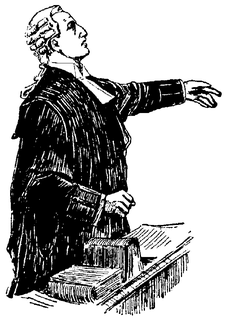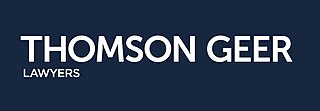
A barrister is a type of lawyer in common law jurisdictions. Barristers mostly specialise in courtroom advocacy and litigation. Their tasks include taking cases in superior courts and tribunals, drafting legal pleadings, researching the philosophy, hypothesis and history of law, and giving expert legal opinions.

A notary public of the common law is a public officer constituted by law to serve the public in non-contentious matters usually concerned with general financial transactions, estates, deeds, powers-of-attorney, and foreign and international business. A notary's main functions are to validate the signature of a person ; administer oaths and affirmations; take affidavits and statutory declarations, including from witnesses; authenticate the execution of certain classes of documents; take acknowledgments ; protest notes and bills of exchange; provide notice of foreign drafts; prepare marine or ship's protests in cases of damage; provide exemplifications and notarial copies; and, to perform certain other official acts depending on the jurisdiction. Such transactions are known as notarial acts, or more commonly, notarizations. The term notary public only refers to common-law notaries and should not be confused with civil-law notaries.
A solicitor is a legal practitioner who traditionally deals with most of the legal matters in some jurisdictions. A person must have legally-defined qualifications, which vary from one jurisdiction to another, to be described as a solicitor and enabled to practise there as such. For example, in England and Wales a solicitor is admitted to practise under the provisions of the Solicitors Act 1974. With some exceptions, practising solicitors must possess a practising certificate. There are many more solicitors than barristers in England; they undertake the general aspects of giving legal advice and conducting legal proceedings.
A law society is an association of lawyers with a regulatory role that includes the right to supervise the training, qualifications, and conduct of lawyers. Where there is a distinction between barristers and solicitors, solicitors are regulated by the law societies and barristers by a separate bar council.
The call to the bar is a legal term of art in most common law jurisdictions where persons must be qualified to be allowed to argue in court on behalf of another party and are then said to have been "called to the bar" or to have received "call to the bar". "The bar" is now used as a collective noun for barristers, but literally referred to the wooden barrier in old courtrooms, which separated the often crowded public area at the rear from the space near the judges reserved for those having business with the court. Barristers would sit or stand immediately behind it, facing the judge, and could use it as a table for their briefs.
Legal ethics are principles of conduct that members of the legal profession are expected to observe in their practice. They are an outgrowth of the development of the legal profession itself.
The Attorney General of Ireland is a constitutional officer who is the legal adviser to the Government and is therefore the chief law officer of the State. The attorney general is not a member of the Government but does participate in cabinet meetings when invited and attends government meetings. The current attorney general is Paul Gallagher, SC.

Articled clerk is a title used in Commonwealth countries for one who is studying to be an accountant or a lawyer. In doing so, they are put under the supervision of someone already in the profession, now usually for two years, but previously three to five years was common. This can be compared as being an intern for a company. Trainees are obligated to sign a contract agreeing to the terms of being an articled clerk. The articled clerk signs a contract, known as "articles of clerkship", committing to a fixed period of employment. Wharton's Law Lexicon defines an articled clerk as "a pupil of a solicitor, who undertakes, by articles of clerkship, continuing covenants, mutually binding, to instruct him in the principles and practice of the profession". The contract is with a specific partner in the firm and not with the firm as a whole.
Legal executives are a form of trained legal professional in certain jurisdictions. They often specialise in a particular area of law. The training that a Legal Executive undertakes usually includes both vocational training and academic qualifications.

Barristers in England and Wales are one of the two main categories of lawyer in England and Wales, the other being solicitors. Barristers have traditionally had the role of handling cases for representation in court, both defence and prosecution.
An admission to practice law is acquired when a lawyer receives a license to practice law. In jurisdictions with two types of lawyer, as with barristers and solicitors, barristers must gain admission to the bar whereas for solicitors there are distinct practising certificates.
The Solicitors Regulation Authority (SRA) is the regulatory body for solicitors in England and Wales.
The Victorian Board of the Medical Board of Australia is the state body for Victoria which has powers delegated to it by the Medical Board of Australia, the national body that regulates the medical profession in Australia. The operations of the Board are enabled by the Health Practitioner Regulation National Law (Vic) Act 2009, which also governs authorities for other health professions in Victoria. This Act replaced the Health Professions Registration Act 2005, under which the forerunner Board operated until 1 July 2007, and which was the successor to the Medical Practice Act 1994. The Victorian Board's delegated powers allow it to make individual practitioner registration and notification (complaints) decisions within the state, based on the national policies and standards set by the National Board.

Founded in 1841, Corrs Chambers Westgarth is a leading, independent Australian commercial law firm. Its clients include national and international corporations, governments, banks and financial sponsors.

The Malaysian Bar is a professional body which regulates the profession of lawyers in peninsular Malaysia. In Malaysia, there is no distinction between a barrister and a solicitor, in that, it is a fused profession. Membership into the Bar is automatic and mandatory. The bar was created under the Legal Profession Act 1976. Like other bar associations around the world, it has a wide range of functions, including, to protect the reputation of the legal profession, to uphold the cause of justice, to express its views on matters relating to legislations, and others.
The Law Society of New South Wales is a professional association which represents over 29,000 solicitors in Australia. The Law Society has statutory powers and regulates the practice of law in New South Wales.
In Australia, trust money in the legal industry is the money a law practice holds on behalf of a client or other people in the course of, or in connection with, the provision of legal services. Trust money is required to be held by a law firm on a client's behalf in a trust account with a bank and is highly regulated. A lawyer or law firm should not appropriate a client's trust money until certain regulations are met, which are different for each state in Australia. The Australian system regulating lawyers and their trust accounts has been labeled by the Rudd Government as an "unwieldy monster".

Thomson Geer is an independent Australian commercial law firm founded in 1885. Its predecessor firms included Thomsons Lawyers and Herbert Geer. The firm operates a full commercial law service as a fully integrated national firm with offices in Sydney, Melbourne, Brisbane, Perth and Adelaide. It is one of the top ten firms in the country by revenue, and the seventh largest firm in Australia by headcount.

Wendy Anne Harris QC is an Australian barrister, former president of the Victorian Bar and past president of the Commercial Bar Association of Victoria. She is a commercial barrister and Queen's Counsel specialising in complex disputes, transactional advice and class actions.
John Cain is a lawyer and son and grandson of the 41st and 34th Premiers of Victoria, Australia.








